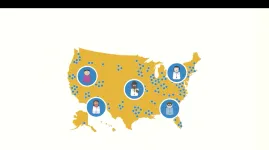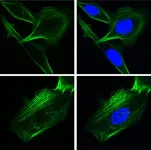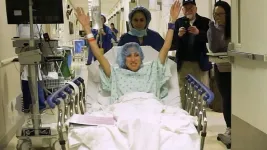(Press-News.org) We trust our doctors with our lives, but the sad and scary fact is that doctors can get things wrong. Approximately 100,000 Americans die each year due to medical errors and recent studies have found that 10 to 15% of all clinical decisions regarding patient diagnosis and treatment are wrong.
A team of researchers led by Damon Centola, Professor and Director of the Network Dynamics Group at the Annenberg School for Communication at the University of Pennsylvania, has found a simple, effective way to reduce errors in patient diagnosis and treatment — use structured networks to connect clinicians with other clinicians.
In a study published today in the journal Proceedings of the National Academy of Sciences (PNAS), the researchers shared results from a multi-year study involving nearly 3,000 doctors across the United States.
They found that when presented with a case study and asked to provide diagnosis and treatment recommendations for a patient, clinicians who were shown the diagnostic decisions of their peers on an anonymous basis, were on average twice as accurate in their recommendations than clinicians who made decisions on their own.
Simply put, doctors make fewer errors when they have a support network.
“The big risk with these information-sharing networks,” says Centola, who is the Elihu Katz Professor of Communication, Sociology, and Engineering, “is that while some doctors may improve, there could be an averaging effect that would lead better doctors to make worse decisions. But, that’s not what happens. Instead of regressing to the mean, there is consistent improvement: The worst clinicians get better, while the best do not get worse.”
Study co-author, Elaine Khoong of the University of California, San Francisco and the San Francisco General Hospital and Trauma Center, says, “We are increasingly recognizing that clinical decision-making should be viewed as a team effort that includes multiple clinicians and the patient as well. This study highlights that having other clinicians available for consultation at the point of decision-making improves clinical care.”
More Than Just the Wisdom of Clinical Crowds
Over the course of several months, the researchers tested clinicians’ treatment and diagnostic decisions through an app that they built and distributed on Apple’s App Store specifically for this purpose.
After signing up for a trial and downloading the app, doctors were prompted to evaluate a clinical case — based on real life documented patient cases — over three rounds. At the start of each round, clinicians read the case study, then were given two minutes to answer two questions.
The first question had the doctors estimate the diagnostic risk for the patient (e.g., how likely is a patient with chest pains to have a heart attack within the next 30 days?) from 1 to 100. The second question prompted doctors to recommend the proper treatment among several options (e.g., send home, give aspirin, or refer for observation).
Every clinician was randomly assigned to one of two groups: either a control group whose members answered all questions in isolation, or an experimental group in which participants were connected in a social network with other anonymous clinicians whose responses they could see.
During rounds two and three, the control group participants had the same experience as in round one, answering questions in isolation. But, participants in the network condition could see the average risk estimates made by their peers in the social network during the previous round.
Every participant was given the opportunity to revise their answers from one round to the next, regardless of whether they were in a social network or not.
Centola’s team used the same experimental design to study seven different clinical cases, each from areas of medicine known to exhibit high rates of diagnostic or treatment error.
The researchers found that the overall accuracy of clinicians’ decisions increased twice as much in the networks as in the control groups. Moreover, among the initially worst performing clinicians, the networks produced a 15% increase over controls in the fraction of clinicians who ultimately made the correct recommendation.
“We can use doctors’ networks to improve their performance,” says Centola. “Doctors talk to each other, and we’ve known that for a long time. The real discovery here is that we can structure the information-sharing networks among doctors to substantially increase their clinical intelligence.”
Leveling the Playing Field
In-person consultation networks in medicine are typically hierarchical with senior practitioners at top and younger doctors at the bottom. “Younger doctors with different perspectives, culturally and personally, come into the medical community and they're influenced by these top-down networks,” Centola says. “This is how persistent biases creep into the medical community.”
The researchers made an effort to recruit clinicians of various ages, specialties, expertise, and geographical locations for the experiment.
They found that anonymized egalitarian networks erased the barriers of status and seniority that, the researchers say, restrict many facets of learning in medical networks. Centola notes, “egalitarian online networks increase the diversity of voices influencing clinical decisions. As a result, we found that decision-making improves across the board for a wide variety of specialties.”
In the Doctor’s Office
“We don’t have to reinvent the wheel to implement these findings,” Centola says. “Some hospitals, especially in low-resource areas, rely on e-consult technologies, in which a clinician sends a message to an outside specialist to get advice. It usually takes from 24 to 72 hours to get a response. Why not send this query to a network of specialists, instead of just a single person?”
Centola notes that each experimental trial took less than 20 minutes. What’s more, he says that the networks don’t have to be huge. In fact, 40 members is ideal.
“Forty people in a network gets you a steep jump in clinicians’ collective intelligence,” Centola says. “The increasing returns above that - going, say, from 40 to 4,000 - are minimal.”
The researchers are currently working to implement their network technology in physician offices. The Hospital of the University of Pennsylvania has already funded pilot implementation of this program, set to begin within the year.
The study, “Experimental Evidence for Structured Information-Sharing Networks Reducing Medical Errors” was authored by Damon Centola, Joshua Becker of University College London, Jingwen Zhang of University of California, Davis, Jaya Aysola of the Penn Medicine Center for Health Equity Advancement, Douglas Guilbeault of the University of California, Berkeley, and Elaine Khoong and published in Proceedings of the National Academy of Sciences.
END
One way to reduce medical errors? Connect doctors with other doctors
A new PNAS study led by Professor Damon Centola uncovers how information-sharing networks can improve medical care.
2023-07-24
ELSE PRESS RELEASES FROM THIS DATE:
Study finds new, unexpected mechanism of cancer cell spread
2023-07-24
A surprising finding from USC reveals key details about how cancer cells metastasize and suggests new therapeutic approaches for halting their spread.
The research, supported by the National Institutes of Health, centers on a cellular chaperone protein known as GRP78, which helps regulate the folding of other proteins inside cells. Previous studies from the same team, led by Amy S. Lee, PhD, professor of biochemistry and molecular medicine at the Keck School of Medicine of USC, have shown that when cells are under stress (due to COVID-19 or cancer), GRP78 gets hijacked, allowing viral invaders to replicate, ...
Sahara dust can enhance removal of methane
2023-07-24
The study by Maarten van Herpen et al., entitled “Photocatalytic Chlorine Atom Production on Mineral Dust-Sea Spray Aerosols over North Atlantic,” was funded in part by the NGO Spark Climate Solutions. It incorporates a proposed new mechanism whereby blowing mineral dust mixes with sea-spray to form Mineral Dust-Sea Spray Aerosol (MDSA).
The results suggest that MDSA is activated by sunlight to produce an abundance of chlorine atoms, which oxidize atmospheric methane and tropospheric ozone via photocatalysis. Largely composed of blowing dust from the Sahara Desert combined with sea salt aerosol from the ocean, MDSA is the dominant source of atmospheric ...
Unlocking secrets of the elusive ghost shark
2023-07-24
Researchers from the University of Florida and the Seattle Aquarium are exploring 100 meters underwater in the Pacific Northwest this summer to learn more about mysterious ghost sharks, one of the strangest beasts from the depths of the ocean.
Using remotely operated underwater vehicles, or ROVs, the scientists searched for nesting grounds of the Pacific spotted ratfish, Hydrolagus colliei, a ghostlike fish that lurks on the ocean floor.
“We know very little about these elusive relatives of sharks and even less about their spawning habits and embryonic development,” said ...
Risk of fatal heart attack may double in heat wave & high fine particulate pollution days
2023-07-24
Research Highlights:
An analysis of more than 202,000 heart attack deaths between 2015-2020 in a single Chinese province found that days that had extreme heat, extreme cold or high levels of fine particulate matter (PM2.5) air pollution were significantly associated with the risk of death from a heart attack, especially in women and older adults.
The greatest increase in the risk of death from heart attack was seen on days that had the combination of extreme heat and high levels of PM2.5.
The days with extreme heat were associated ...
Study shows positive outcomes for first three U.S. living HIV-to-HIV kidney transplant donors
2023-07-24
Based on findings from a study published today in the journal, The Lancet Regional Health – Americas, researchers at Johns Hopkins Medicine and three collaborating medical institutions suggest that people living with the human immunodeficiency virus (HIV) who donate a kidney to other people living with HIV (PLWH) have a low risk of developing end-stage kidney disease (ESKD) or other kidney problems in the years following the donation.
“This new evidence is proof-of-concept that donating a kidney can be safe for people living with HIV,” says Christine Durand, M.D., associate professor of medicine at Johns ...
Webb detects water vapor in rocky planet-forming zone
2023-07-24
Water is essential for life as we know it. However, scientists debate how it reached the Earth and whether the same processes could seed rocky exoplanets orbiting distant stars. New insights may come from the planetary system PDS 70, located 370 light-years away. The star hosts both an inner disk and outer disk of gas and dust, separated by a 5 billion-mile-wide (8 billion kilometer) gap, and within that gap are two known gas-giant planets.
New measurements by NASA’s James Webb Space Telescope’s MIRI (Mid-Infrared Instrument) have detected water vapor in the system’s inner disk, at distances ...
Diagnosis of cystic fibrosis often missed or delayed, especially in non-White infants
2023-07-24
Ann & Robert H. Lurie Children’s Hospital of Chicago is leading an awareness campaign that aims to reduce missed or delayed diagnosis of cystic fibrosis after newborn screening, especially in non-White infants. In its first phase, the campaign targets primary care providers and public health officials, so that treatment can start earlier, which is linked to better outcomes for people with cystic fibrosis. The general public phase is expected to follow within the year.
Funded by the Centers for Disease Control and Prevention ...
Potent anti-cancer therapy created using ‘click chemistry’
2023-07-24
A potent anti-cancer therapy has been created using Nobel prize-winning “click chemistry”, where molecules click together like LEGO bricks, in a new study by UCL and Stanford University researchers.
The study, published in Nature Chemistry, opens up new possibilities for how cutting-edge cancer immunotherapies might be built in future.
The research team created an anti-cancer therapy with three components: one targeting the cancer cell, another recruiting a white blood cell called a T cell to attack the cancer cell, and a third knocking out part of the cancer cell’s defences.
Previously, ...
Claire K. Ankuda, MD, MPH (Mount Sinai Health System) recognized with AFAR 2023 Rising Star Award in Health Services and Aging Research
2023-07-24
New York, NY – The American Federation for Aging Research (AFAR), a national non-profit organization whose mission is to support and advance healthy aging through biomedical research, is proud to recognize the outstanding contributions of Claire K. Ankuda, MD, MPH, MSc with the 2023 Terrie Fox Wetle Rising Star Award in Health Services and Aging Research.
This award honors a health services researcher in an early or middle phase of his/her career who has already made important contributions with work that respects the value of multidisciplinary health services ...
Ming Xu, PhD (UConn) receives AFAR 2023 Vincent Cristofalo Rising Star Award in Aging Research
2023-07-24
New York, NY – The American Federation for Aging Research (AFAR), a national non-profit organization whose mission is to support and advance healthy aging through biomedical research, is pleased to recognize the exemplary contributions of Ming Xu, PhD, to the field of aging research through the 2023 Vincent Cristofalo Rising Star Award in Aging Research.
This award is named in honor of the late Dr. Cristofalo, who dedicated his career to aging research and to encouraging young scientists to investigate important problems in the biology of aging. Established in 2008, the award is a ...
LAST 30 PRESS RELEASES:
Kidney cancer study finds belzutifan plus pembrolizumab post-surgery helps patients at high risk for relapse stay cancer-free longer
Alkali cation effects in electrochemical carbon dioxide reduction
Test platforms for charging wireless cars now fit on a bench
$3 million NIH grant funds national study of Medicare Advantage’s benefit expansion into social supports
Amplified Sciences achieves CAP accreditation for cutting-edge diagnostic lab
Fred Hutch announces 12 recipients of the annual Harold M. Weintraub Graduate Student Award
Native forest litter helps rebuild soil life in post-mining landscapes
Mountain soils in arid regions may emit more greenhouse gas as climate shifts, new study finds
Pairing biochar with other soil amendments could unlock stronger gains in soil health
Why do we get a skip in our step when we’re happy? Thank dopamine
UC Irvine scientists uncover cellular mechanism behind muscle repair
Platform to map living brain noninvasively takes next big step
Stress-testing the Cascadia Subduction Zone reveals variability that could impact how earthquakes spread
We may be underestimating the true carbon cost of northern wildfires
Blood test predicts which bladder cancer patients may safely skip surgery
Kennesaw State's Vijay Anand honored as National Academy of Inventors Senior Member
Recovery from whaling reveals the role of age in Humpback reproduction
Can the canny tick help prevent disease like MS and cancer?
Newcomer children show lower rates of emergency department use for non‑urgent conditions, study finds
Cognitive and neuropsychiatric function in former American football players
From trash to climate tech: rubber gloves find new life as carbon capturers materials
A step towards needed treatments for hantaviruses in new molecular map
Boys are more motivated, while girls are more compassionate?
Study identifies opposing roles for IL6 and IL6R in long-term mortality
AI accurately spots medical disorder from privacy-conscious hand images
Transient Pauli blocking for broadband ultrafast optical switching
Political polarization can spur CO2 emissions, stymie climate action
Researchers develop new strategy for improving inverted perovskite solar cells
Yes! The role of YAP and CTGF as potential therapeutic targets for preventing severe liver disease
Pancreatic cancer may begin hiding from the immune system earlier than we thought
[Press-News.org] One way to reduce medical errors? Connect doctors with other doctorsA new PNAS study led by Professor Damon Centola uncovers how information-sharing networks can improve medical care.









